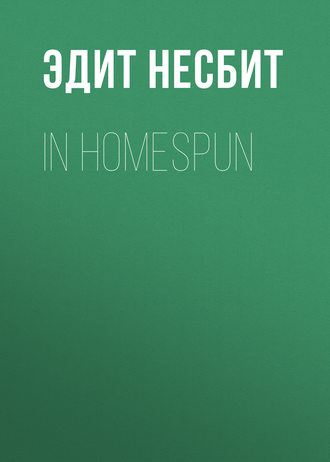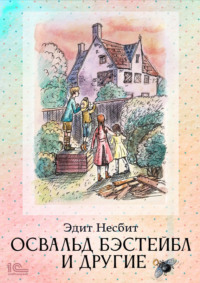 полная версия
полная версияIn Homespun
Afore the day come, old Mrs. Jezebel up at the farm, she met me one day, and she says, 'You're a pretty puss, aren't you, howking up my poor dear deceased husband's remains before they're hardly cold? Much good you'll do yourself. You'll end in the workhouse, my fine miss, and I shall come to see you as a lady visitor when you're dying.'
I tried to get past her, but she wouldn't let me. 'I wish you joy o' that Harry, cursed young brute!' says she. 'It serves him right, it does, to marry a girl out of the gutter!'
And with that—I couldn't help it—I fetched her a smack on the side of the face with the flat of my hand as hard as I could, and bolted off, her after me, and me being young and she stout she couldn't keep up with me. Gutter, indeed! and my father a respectable labourer, and known far and wide.
There were several strangers come the day the coffin was got up. It was a dreadful thing to me to see them digging, not to make a grave to be filled up, but to empty one. And there were a lot of people there I didn't know; and the parson, and another parson, seemingly a friend of his, and every one as could get near looking on.
They got the coffin up, and they took it to the room at the Star, at Alfreston, where inquests are held, and the doctors were there, and we were all shut out. And Harry and John and I stood on the stairs. But parson, being a friend of the doctor's, he was let in, him and his friend. And we heard voices and the squeak of the screws as they was drawn out; and we heard the coffin lid being laid down, and then there was a hush, and some one spoke up very sharp inside, and we couldn't hear what he said for the noise and confusion that came from every one speaking at once, and nineteen to the dozen it seemed.
'What is it?' says Harry, trembling like a leaf: 'O my God! what is it? If they don't open the door afore long, by God, I shall burst it open! He was murdered, he was! And if they wait much longer, that woman will have time to get away.'
As he spoke, the door opened and parson came out, and his friend with him.
'These are the young men,' says our parson.
'Well, then,' says parson number two, 'it's a good thing I heard of this, and came down—out of mere curiosity, I am ashamed to say—for the man who is buried there is not the man whom I united in holy matrimony to Martha Blake two months ago last Tuesday.'
We didn't understand.
'But the poison?' says Harry.
'She may have poisoned him,' said our parson, 'though I don't think it. But from what my friend here, the rector of St Mary Woolnoth, tells me, it is quite certain she never married him.'
'Then she's no right to anything?' said Harry.
'But what about the will?' says I. But no one harkened to me.
And then Harry says, 'If she poisoned him she will be off by now. Parson, will you come with me to keep my hands from violence, and my tongue from evil-speaking and slandering? for I must go home and see if that woman is there yet.'
And parson said he would; and it ended in us, all five of us, going up together, the new parson walking by me and talking to me like somebody out of the Bible, as it might be one of the disciples.
I got to know him well afterwards, and he was the best man that ever trod shoe-leather.
We all went up together to Charleston Farm, and in through the back, without knocking, and so to the parlour door. We knew she was sitting in the parlour, because the red firelight fell out through the window, and made a bright patch that we see before we see the house itself properly; and we went, as I say, quietly in through the back; and in the kitchen I said, 'Oh, let me tell her, for what she said to me.'
And I was sorry the minute I'd said it, when I see the way that clergyman from London looked at me; and we all went up to the parlour door, and Harry opened it as was his right.
There was Mrs. Blake sitting in front of the fire. She had got on her widow's mourning, very smart and complete, with black crape, and her white cap; and she'd got the front of her dress folded back very neat on her lap, and was toasting her legs, in her black-and-red checked petticoat, and her feet in cashmere house-boots, very warm and cosy, on the brass fender; and she had got port wine and sherry wine in the two decanters that was never out of the glass-fronted chiffonier when master was alive; and there was something else in a black bottle; and opposite her, in the best arm-chair that old master had sat in to the last, was that lawyer, Sigglesfield from Lewes. And when we all came in, one after another, rather slow, and bringing the cold air with us, they sat in their chairs as if they had been struck, and looked at us.
Harry and John was in front, as was right; and in the dusk they could hardly see who was behind.
'And what do you want, young men?' says Mrs. Blake, standing up in her crape, and her white cap, and looking very handsome, Harry said afterwards, though, for my part, I never could see it; and, as she stood up, she caught sight of the clergyman from London, and she shrank back into her chair and covered her face with her hands; and the clergyman stepped into the room, none of us having the least idea of what he was going to say, and said he—
'That's the woman that I married on the 7th; and that's the man I married her to!' said he, pointing to Sigglesfield, who seemed to turn twice as small, and his ferret eyes no better than button-hole slits.
'That!' said our parson; 'why, that's Mr. Sigglesfield, the solicitor from Lewes.'
'Then the lady opposite is Mrs. Sigglesfield, that's all,' said the parson from London.
'What I want to know,' says Harry, 'is—is this my house or hers? It's plain she wasn't my father's wife. But yet he left it to her in the will.'
'Slowly, old boy!' said John; 'gently does it. How could he have left anything in a will to his wife when he hadn't got any wife? Why, that fellow there–'
But here Mrs. Blake got on her feet, and I must say for the woman, if she hadn't got anything else she had got pluck.
'The game's up!' she says. 'It was well played, too, though I says it. And you, you old fool!' she says to the parson, 'you have often drunk tea with me, and gone away thinking how well-mannered I was, and what a nice woman Mrs. Blake was, and how well she knew her place, after you had chatted over half your parish with me. I know you are the curiousest man in it, and as you and me is old friends, I don't mind owning up just to please you. It'll save a lot of time and a lot of money.'
'It's my duty to warn you,' said John, 'that anything you say may be used against you.'
'Used against a fiddlestick end!' said Mrs. Blake. 'I married Robert Sigglesfield in the name of William Alderton, and he sitting trembling there, like a shrimp half boiled! He got ready the kind of will we wanted instead of the one the old man meant, and gave it to the old man to sign, and he signed it right enough.'
'And what about that arsenic,' says I,—'that arsenic I found in your corner cupboard?'
'Oh, it was you took it, was it? You little silly, my neck's too handsome for me to do anything to put a rope round it. Do you suppose I've kept my complexion to my age with nothing but cold water, you little cat?'
'And the other will,' says Harry, 'that my father meant to sign?'
'I'll get you that,' says Mrs. Blake. 'It's no use bearing malice now all's said and done.'
And she goes upstairs to get it, and, if you'll believe me, we were fools enough to let her go; and we waited like lambs for her to come back, which being a woman with her wits about her, and no fool, she naturally never did; and by the time we had woke up to our seven senses, she was far enough away, and we never saw her again. We didn't try too much. But we had the law of that Sigglesfield, and it was fourteen years' penal.
And the will was never found—I expect Mrs. Blake had burnt it,—so the farm came to John, and what else there was to Harry, according to the terms of the will the old man had made when his wife was alive, afore John had joined the force. And Harry and John was that pleased to be together again that they couldn't make up their minds to part; so they farm the place together to this day.
And if Harry has prospered, and John too, it's no more than they deserve, and a blessing on brotherly love, as mother says. And if my dear children are the finest anywhere on the South Downs, that's by the blessing of God too, I suppose, and it doesn't become me to say so.
ACTING FOR THE BEST
I HAVE no patience with people who talk that kind of nonsense about marrying for love and the like. For my part I don't know what they mean, and I don't believe they know it themselves. It's only a sort of fashion of talking. I never could see what there was to like in one young man more than another, only, of course, you might favour some more than others if they was better to do.
My cousin Mattie was different. She must set up to be in love, and walk home from church with Jack Halibut Sunday after Sunday, the long way round, if you please, through the meadows; and he used to buy her scent and ribbons at the fair, and send her a big valentine of lacepaper, and satin ribbons and things, though Lord knows where he got the money from—honest, I hope—for he hadn't a penny to bless himself with.
When my uncle found out all this nonsense, being a man of proper spirit, he put his foot down, and says he—
'Mattie, my girl, I would be the last to say anything against any young man you fancied, especially a decent chap like young Halibut, if his prospects was anything like as good as could be expected, but you can't pretend poor Jack's are, him being but a blacksmith's man, and not in regular work even. Now, let's have no waterworks,' he went on, for Mattie had got the corner of her apron up and her mouth screwed down at the corners. 'I've known what poverty is, my girl, and you shan't never have a taste of it with my consent.'
'I don't care how poor I be, father,' said Mattie, 'it's Jack I care about.'
'There's a girl all over,' says uncle, for he was a sensible man in those days. 'The bit I've put by for you, lass, it's enough for one, but it's not enough for two. And when young Halibut can show as much, you shall be cried in church the very next Sunday. But, meantime, there must be no kisses, no more letters, and no more walking home from churches. Now, you give me your word—and keep it I know you will—like an honest girl.'
So Mattie she gave him her word, though much against her will; and as for Jack, I suppose, man-like, he didn't care much about staying in the village after there was a stop put to his philandering and kissing and scent and so on. So what does he do, but he ups and offs to America (assisted emigration) 'to make his fortune,' says he.
And never word nor sign did we hear of him for three blessed years. Mattie was getting quite an old maid, nigh on two-and-twenty, and I was past nineteen, when one morning there come a letter from Jack.
My father and mother were dead this long time, so I lived with uncle and Mattie at the farm. What offers I had had is neither here nor there. At any rate, whatever they were, they weren't good enough.
But Mattie might have been married twice over if she had liked, and to folks that would have been quite a catch to a girl like her getting on in years. She might have had young Bath for one, the strawberry grower; and what if he did drink a bit of a Saturday? He was taking his hundreds of pounds to the Bank every week in canvas bags, as all the world knew.
But no, she must needs hanker after Jack, and that's why I say it's such nonsense.
Well, when the letter come, I was up to my elbows in the jam-making—raspberry and currant it was,—and Mattie, she was down in the garden getting the last berries off the canes. My hands were stained up above the wrist with the currant juice, so I took the letter up by the corner of my apron and I went down the garden with it.
'Mattie,' I calls out, 'here's a letter from that good-for-nothing fellow of yours.'
She couldn't see me, and she thought I was chaffing her about him, which I often did, to keep things pleasant.
'Don't tease me, Jane,' she says, 'for I do feel this morning as if I could hardly bear myself as it is.'
And as she said it I came out through the canes close to her with the letter in my hand. But when she see the letter she dropped the basket with the raspberries in it (they rolled all about on the ground right under the peony bush, for that was a silly, old-fashioned garden, with the flowers and fruit about it anyhow), and I had a nice business picking them up, and she threw her arms round my neck and kissed me, and cried like the silly little thing she was, and thanked me for bringing the letter, just as if I had anything to do with it, or any wish or will one way or another; and then she opened the letter, and seemed to forget all about me while she read it.
I remember the sun was so bright on the white paper that I could scarce see to read it over her shoulder, she not noticing me, nor anything else, any more. It was like this—
'DEAR MATTIE,—This comes hoping to find you well, as it leaves me at present.
'I don't bear no malice over what your father said and done, but I'm not coming to his house.
'Now Mattie, if you have forgot me, or think more of some other chap, don't let anything stand in the way of your letting me know it straight and plain. But if you do remember how we used to walk from church, and the valentine, and the piece of poetry about Cupid's dart that I copied for you out of the poetry-book, you will come and meet me in the little ash copse, you know where. I may be prevented coming, for I've a lot of things to see to, and I am going to Liverpool on Thursday, and if we are to be married you will have to come to me there, for my business won't bear being left, and I must get back to it. But if so I will put a note in your prayer-book in the church. So you had best look in there on your way up on Wednesday evening.
'I am taking this way of seeing you because I don't want there to be any unpleasantness for you if you are tired of me or like some other chap better.
'I mean to take a wife back with me, Mattie, for I have done well, and can afford to keep one in better style than ever your father kept his. Will you be her, dear? So no more at present from your affectionate friend and lover,
JACK HALIBUT.'I am quicker at reading writing than Mattie, and I had finished the letter and was picking up the raspberries before she come to the end, where his name was signed with all the little crosses round it.
'Well?' says I, as she folded it up and unbuttoned two buttons of her dress to push it inside. 'Well,' says I, 'what's the best news?'
'He's come home again,' she says. And I give you my word she did look like a rose as she said it. 'He's come home again, Jane, and it's all right, and he likes me just as much as ever he did, God bless him.'
Not a word, you see, about his having made his fortune, which I might never have known if I hadn't read the letter which I did, acting for the best. Not that I think it was deceitfulness in the girl, but a sort of fondness that always kept her from noticing really important things.
'And does he ask you to have him?' says I.
'Of course he does,' she says; 'I never thought any different. I never thought but what he would come back for me, just as he said he would—just as he has.'
By that I knew well enough that she had often had her doubts.
'Oh, well!' says I, 'all's well that ends well.
I hope he's made enough to satisfy uncle—that's all.'
'Oh yes, I think so,' says Mattie, hardly understanding what I was saying. 'I didn't notice particular. But I suppose that's all right.'
She didn't notice particular! Now, I put it to you, Was that the sort of girl to be the wife of a man who had got on like Jack had? I for one didn't think so. If she didn't care for money why should she have it, when there was plenty that did? And if love in a cottage was what she wanted, and kisses and foolishness out of poetry-books, I suppose one man's pretty much as good as another for that sort of thing.
So I said, 'Come along in, dear, and we will get along with the jam-making, and talk it all over nicely. I'm so glad he's come back. I always say he would, if you remember.'
Not that I ever had, but she didn't seem to know any different, anyhow.
The next few days Mattie was like a different girl. I will say for her that she always did her fair share of the work, but she did it with a face as long as a fiddle. Only now her face was all round and dimply, and like a child's that has got a prize at school.
On Wednesday afternoon she said to me, 'I'm going to meet Jack, and don't you say a word to the others about it, Jane. I'll tell father myself when I come back, if you'll get the tea like a good girl, and just tell them I've gone up to the village.'
'I don't tell lies as a rule, especially for other people,' I says; 'but I don't mind doing it for you this once.'
And she kissed me (she had got mighty fond of kissing these last few days), and ran upstairs to get ready. When she come down, if you'll believe me, she wasn't in her best dress as any other girl would have been, but she had gone and put on a dowdy old green and white delaine that had been her Sunday dress, trimmed with green satin piping, three years before, and the old hat she had with all the flowers faded and the ribbons crumpled up, that was three year old too, and the very one she used to walk home from church with him on Sundays in. And her with a really good blue poplin laid by and a new bonnet with red roses in it, only come home the week before from Maidstone.
She come through the kitchen where I was setting the tea, and she took the key of the church off the nail in the wall. Our farm was full a mile from the village, and half way between it and the church. So we kept one key, and Jack's uncle, who was the sexton, he had the other.
'What time was you to meet Jack?' I says.
'He didn't say,' said she; 'but it used to be half-past six.'
'You're full early,' says I.
'Yes,' she says, 'but I've got to take the butter down to Weller's, and to call in for something first.'
And, of course, I knew that she meant that she had to call in for that note at the church.
Minute she was out of the way, I runs into the kitchen, and says to our maid—
'Poor Mrs. Tibson's not so well, Polly. I'm going over to see her. Give the men their tea, will you? there's a good girl.'
And she said she would. And in ten minutes I was dressed, and nicely dressed too, for I had on my white frock and the things I had had at a girl's wedding the summer before, and a pair of new gloves I had got out of my butter-money.
Then I went off up the hill to the church after Mattie, even then not making up my mind what I was going to do, but with an idea that all things somehow might work together for good to me if I only had the sense to see how, and turn things that way.
As I come up to the church I was just in time to see her old green gown going in at the porch, and when I come up the key was in the door, and she hadn't come out. Quick as thought, the idea come to me to have a joke with her and lock her in, so she shouldn't meet him, and next minute I had turned the key in the lock softly, and stole off through the church porch, and up to the ash copse, which I couldn't make a mistake about, for there's only one within a mile of the church.
Jack was there, though it was before the time. I could see his blue tie and white shirt-front shining through the trees.
When I locked her in I only meant to have a sort of joke—at least, I think so,—but when I come close up to him and saw how well off he looked, and the diamond ring on his fingers, and his pin and his gold chain, I thought to myself—
'Well, you go to Liverpool to-morrow, young man! And she ain't got your address, and, likely as not, if you go away vexed with her, you won't leave it with your aunt, and one wife is as good as another, if not better, and as for her caring for you, that's all affectation and silliness—so here goes.'
He stepped forward, with his hands held out to me, but when he saw it was me he stopped short.
'Why, Miss Jane,' he said, 'I beg your pardon. I was expecting quite a different person.'
'Yes, I know,' I says, 'you was expecting my cousin Mattie.'
'And isn't she coming?' he asks very quick, looking at me full, with his blue eyes.
'I hope you won't take it hard, Mr. Halibut,' says I, 'but she said she'd rather not come.'
'Confound it!' says he.
'You see,' I went on, 'it's a long time since you was at home, and you not writing or anything, and some girls are very flighty and changeable; and she told me to tell you she was sorry if you were mistaken in her feelings about you, and she's had time to think things over since three years ago; and now you're so well off, she says she's sure you'll find no difficulty in getting a girl suited to your mind.'
'Did she say that?' he said, looking at me very straight. 'It's not like her.'
'I don't mean she said so in those words, or that she told me to tell you so; but that's what I made out to be her mind from what she said between us two like.'
'But what message did she send to me? For I suppose she sent you to meet me to-day.'
Then I saw that I should have to be very careful. So to get a little time I says, 'I don't quite like to tell you, Mr. Halibut, what she said.'
'Out with it,' says he. 'Don't be a fool, girl!'
'Well, then,' I says, 'if it must be so, her words were these: "Tell Jack," she says, "that I shall ever wish him well for the sake of what's past, but all's over betwixt him and me, and—"'
'And what,' says he.
'There wasn't much besides,' says I.
'Good God, don't be such an idiot!' and he looked as if he could have shaken me.
'Well, then, if you must have it,' says I, 'she says, "Tell Jack there's at least one girl I know of as would make him a better wife than I should, and has been thinking of him steady and faithful these three years, while I've been giving my mind to far other things."'
'Confound her!' says he, 'little witch. And who is this other girl that she's so gracious to hand me over to?'
'I don't want to say no more,' says I. 'I'm going now, Mr. Halibut. Good-bye.'
For well I knew he wouldn't let me go at that.
'Tell me who it is,' says he. 'What! she's not content with giving me the mitten herself, but she must insult me and this poor girl too, who's got more sense than she has. Good Heavens, it would serve her right if I took her at her word, and took the other girl back with me.'
He was walking up and down with his hands in his pockets, frowning like a July thunderstorm.
'Wicked, heartless little—but there, thank God! all women aren't like her. Who's this girl that she's tried to set me against?'
'I can't tell you,' says I.
'Oh! can't you, my girl? But you shall.'
And he catches hold of both my wrists in his hands.
'Leave me go!' I cried, 'you're hurting me.'
'Who is it?'
I was looking down my nose very straight, but when he said that, I just lifted my eyes up and looked at him, and dropped them.
I've always practised looking like what I meant, or what I wanted people to think I meant—sort of matching your looks and words, like you match ribbon and a bit of stuff.
'So you're the girl, are you?' he cries. 'And she thought to put you to shame before me with her messages? Look here, I'm well off. I'm going to Liverpool to-night, and back to America next week. I want to take a wife with me, and she says you have thought of me while I've been away. Will you marry me, Jane?'
I just looked at him again, and he put his arm round me and gave me a good kiss. I had to put up with it, though I never could see any sense in that sort of stuff. Then we walked home together, very slow, his arm round me.
I daresay some people will think I oughtn't to have acted so, taking away another girl's fellow. But I was quite sure she would get plenty that would play love in a cottage with her, and she did not seem to appreciate her blessings in getting a man that was well off, and I didn't see how it could be found out, as he was going away next day.
Now, it would all have gone as well as well if I had had the sense to offer to see him off at the station, and I ought to have had the sense to see him well out of the place. But we all make mistakes sometimes. Mine was in saying 'Good-bye' to him at the corner of the four-acre and going home by myself, leaving him with three-quarters of an hour for 'Satan to find some mischief still for idle hands to do' in.









